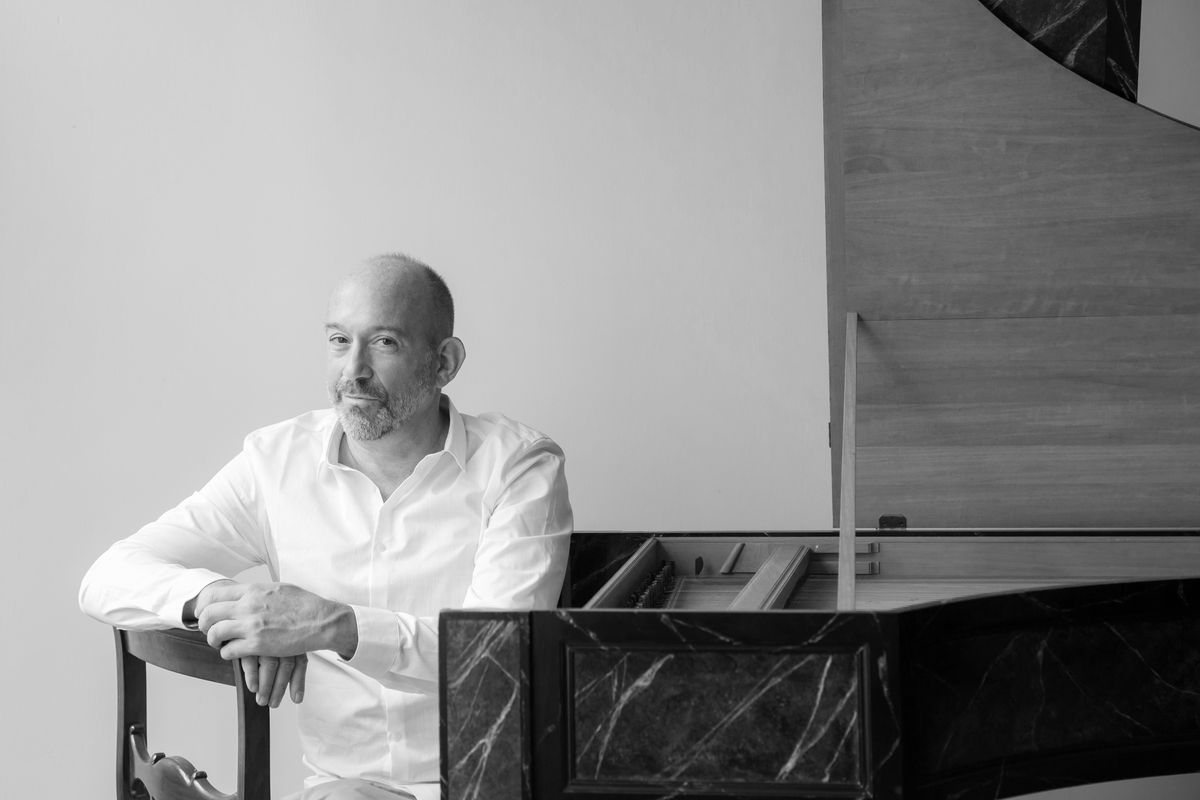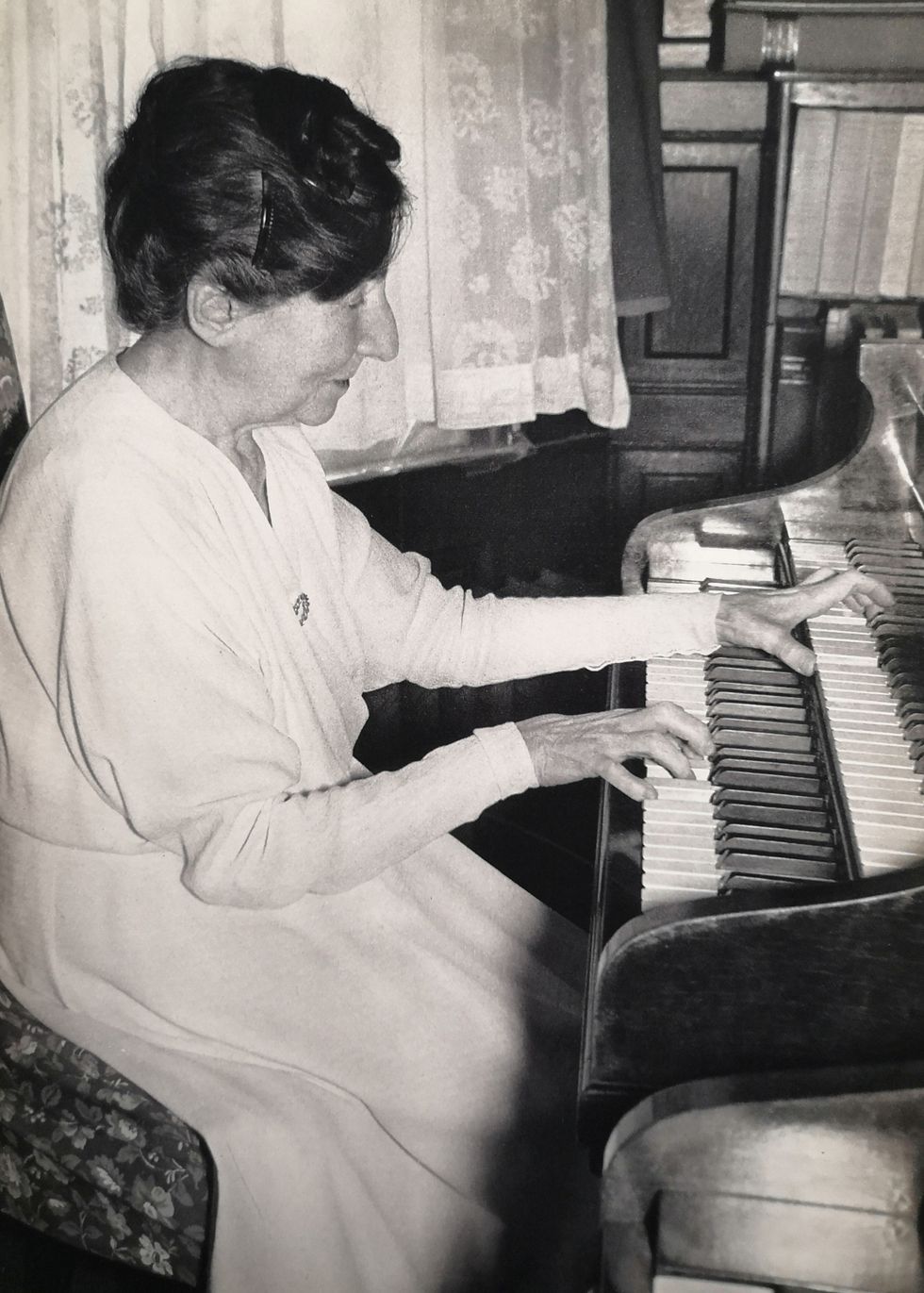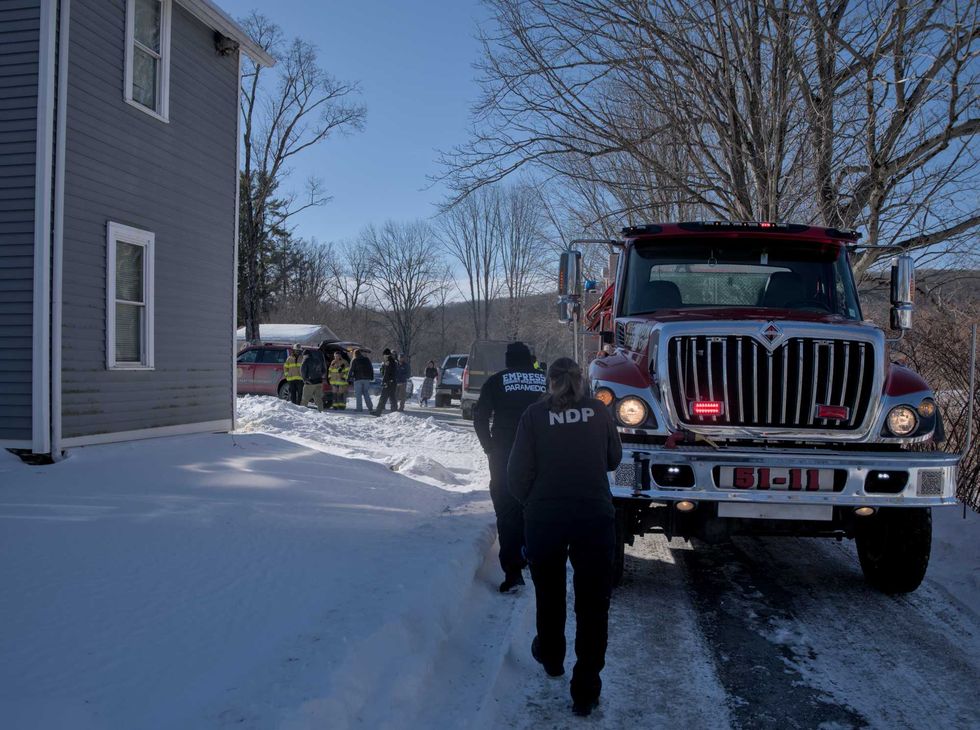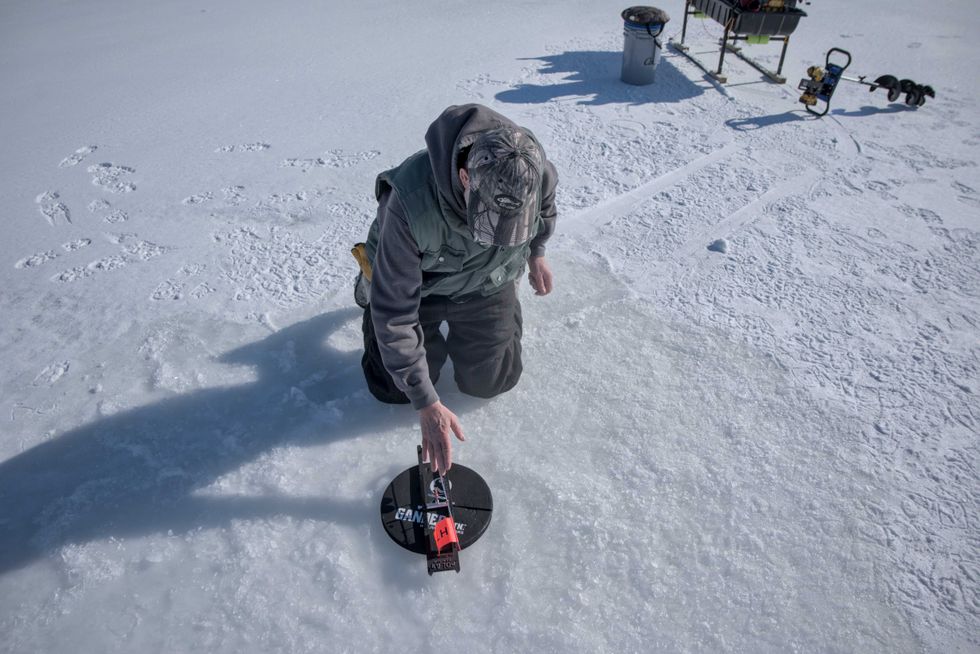Crescendo’s upcoming tribute to Wanda Landowska

Kenneth Weiss (above) will play a solo recital performance in honor of Wanda Landowska, a harpischord virtuoso, who lived in Lakeville for many years.
Provided

Kenneth Weiss (above) will play a solo recital performance in honor of Wanda Landowska, a harpischord virtuoso, who lived in Lakeville for many years.
On Sept. 14, Crescendo, the award-winning music program based in Lakeville, will present a harpsichord solo recital by Kenneth Weiss in honor of world-renowned harpsichordist Wanda Landowska. Landowska lived in Lakeville from 1941 to 1959. Weiss is a professor at the Paris Conservatoire and has taught at Julliard. Born in New York, he now resides in Europe.
Weiss will play selections from “A Treasury of Harpsichord Music.” It includes works by Baroque composers such as Bach, Mozart, and Handel. It was recorded by Landowska at her Lakeville home, at 63 Millerton Road, which overlooks Lakeville Lake. Weiss said, “I am honored and excited to play in Lakeville, where Wanda Landowska lived.”
Landowska fled Nazi Germany in 1941 with two of her students one of whom was Denise Restout, who later became her companion of many years, and a harpsichord in a box. They landed in New York. Landowski performed the Goldberg Variations of Johann Sebastian Bach at New York Town Hall to “Incredible success.” She then looked around for a place to live and found Lakeville where she resided until her death in 1959.
Kenneth Weiss made “a pilgrimage “to Lakeville in the 1980’s. “Madame Restout received us in the kitchen of the home she shared with Landowska. From the two Pleyel Harpsichords to Landowska concert gowns on display it felt as if Landowska had just stepped out.”

Wanda Landowska was a child prodigy. Christine Gevert, Founding Artistic Director of Crescendo said that Landowska “went way beyond the harpsichord to other instruments.”
Landowska commissioned music from composers and wrote some of her own. She also had harpsichords built to order. She founded a music school in Paris where she “invited her students to come and stay on the property as if they were her own children.” She often became a lifelong mentor to students.
Landowska also authored many articles, some of which were translated from Polish and French and made into a book by her life partner Denise Restout who was left to take care of Landowska’s legacy when she died. Most of Landowska’s papers are in the Smithsonian, unfortunately still boxed up.
One reason for Landowska’s fame was that “she changed the course of music and how people perceived and enjoyed it.” She had a Bauhaus architect, Jean-Charles Moreux, design a concert hall, near Paris in the 1920’s, which was filled with light, in contrast to most darkened theaters. She had a low stage built so she could be close to the audience and would bring a carpet and lamp from home “to create ambience” said Gevert. Landowska had a “Holistic concept and made performances more attractive and accessible. She was one of the first performers to talk to the audience.”
The concert will be at the Lakeville Methodist Church at 6 p.m. on Sept. 14. It is presented with special support by Leszek Wojcik, famed Carnegie Hall recording engineer who lives in Lakeville. Wojcik “understands the importance of Landowska’s legacy,” said Gevert, and works with Crescendo to preserve it.
Tickets are available at www.crescendomusic.org or at the door, first come, first serve, forty-five minutes before the concert. Prices are forty dollars for general seats, ten dollars for youths or seventy-five for an up-close seat.
Support for the concert has also been provided to Crescendo by the Connecticut State Department of Economic and Community Development/Connecticut Office of the Arts (COA) from the Connecticut State Legislature, and NBT Bank.
Millerton firefighters exit a rear door at 5873-5875 S. Elm St. in Millerton after responding to a carbon monoxide exposure call at 2 p.m. on Monday, Feb. 9. Millerton Fire Chief Keith Roger said a deep fryer running indoors and the propane furnace may have contributed to the high levels of carbon monoxide in the building.
MILLERTON — As many as six are displaced from their homes due to uncertainty over the safety of the furnace after fumes from a gas-fired deep fryer filled an apartment building on South Elm Street.
Millerton Fire Chief Keith Roger said residents of 5873-5875 S. Elm St. operated a fryer indoors with no ventilation, potentially causing much of the exposure, but the propane furnace may have also contributed. No damage to the building was reported, but three people were treated for carbon monoxide exposure at Sharon Hospital.
Roger said the investigation was turned over to the Village of Millerton building inspector, who deemed the duplex apartment building an unsafe structure until the furnace can be inspected and approved.

Crews from the Millerton Fire Department, Amenia Fire Department, Empress EMS and the New York State Police responded to the call. The building was evacuated and ventilation of the dangerous gas had started when Amenia fire crews arrived on the scene around 2:45 p.m.
Carbon monoxide concentration reached as high as 180 parts per million on the second floor of the building, Roger said. Carbon monoxide exposure starts to become dangerous between 35 and 100 ppm, with concentrations of 200 ppm causing nausea, headaches and dizziness.
Roger said two people had already been transported to Sharon Hospital when first responders arrived. Crews discovered a third person showing signs of exposure during evacuation. No other injuries were reported.
John Dennis, of Millerton, presents a bluegill he caught in Rudd Pond on Friday morning, Feb. 6. Dennis said he catches enough fish for a meal — usually about a dozen fish — before packing up and shuffling off the ice.
MILLERTON — Rudd Pond is open for ice fishing as of Thursday, Feb. 5.
Taconic State Park rangers announced the ice was safe for fishing in a Facebook post Thursday morning. Ice on the pond must average at least 6 inches thick across the entire surface before it is opened to recreation, according to park staff.
On Friday, Feb. 6, Brian Booth of Millbrook and John Dennis of Millerton were out on the ice catching crappie and bluegill at 10 a.m.
"I've been fishing here since I was a kid," Dennis said. He was jigging, which is a fishing technique where a baited hook is dropped through a hole in the ice and "jigged" to simulate natural movement.
Booth was fishing through a combination of jigging and devices called "flip-ups," which have a line connected to a spring-loaded flag that flips up when a fish grabs the hook.

Temperatures are predicted to stay well below freezing for the next week. An extreme cold weather warning was in effect for the region all weekend and stretched into Monday morning on Feb. 9.
Forecasts predict heavy winds and blustery conditions to continue this week, with a chance for temperatures to increase leading into this weekend. Booth and Dennis each said that wind is a major contributor to uncomfortable conditions on the ice, where natural wind breaks are nonexistent.
Dennis uses a sled with a collapsible shelter to haul his ice fishing equipment onto the pond. He said that the tent can be a great boon, especially when combined with a small space heater.
"I could fish in my t-shirt," Dennis said.
But wind has caused problems when Dennis’s sled wasn’t anchored properly. He said he was dragged across the ice by strong gusts during a recent trip to a frozen lake in Connecticut.
Rudd Pond is open from sunrise to sunset year-round. Taconic State Park employees said they will continue to monitor the ice and provide updates on its status.
Drivers should expect more police on the roads this weekend as law enforcement warns of ramped-up DWI check-points over Super Bowl weekend.
Law enforcement is expected to ramp up DWI check-points across the region this weekend.
Across Dutchess County, local law enforcement agencies will take part in a “high-visibility enforcement effort” during Super Bowl weekend aimed at preventing drivers from operating vehicles under the influence of drugs and alcohol. Increased patrols and sobriety checkpoints are planned throughout the county from Sunday, Feb. 8, through Monday, Feb. 9.
In a statement, Dutchess County Executive Sue Serino emphasized the need for safe roads and thanked law enforcement who “work year-round to keep our neighborhoods safe.” She added, “Make the winning play during Super Bowl weekend and plan for a safe ride home.”
Nationwide, traffic fatality data indicates Super Bowl Sunday is one of the deadliest days of the year for impaired driving, with a significantly higher number of alcohol-related deaths than on typical Sundays.
During the Jan. 29 Village Board meeting, trustees voted to sign the annual STOP-DWI agreement with Dutchess County, part of a statewide effort to keep dangerous drivers off the roads. Similar efforts also take place around Memorial Day, Independence Day, Labor Day, Halloween, Thanksgiving and during the December holiday season.
Millerton Police Chief Joseph Olenik said his department typically participates in all DWI check-points, but will not this weekend because of staffing issues. He said that does not mean county and state police will not be active in the Millerton area.
Students wore black at Housatonic Valley Regional High School Friday, Jan. 30, while recognizing a day of silence to protest Immigration and Customs Enforcement.
FALLS VILLAGE — In the wake of two fatal shootings involving Immigration and Customs Enforcement agents in Minnesota, students across the country have organized demonstrations to protest the federal agency. While some teens have staged school walkouts or public protests, students at Housatonic Valley Regional High School chose a quieter approach.
On Friday, Jan. 30, a group of HVRHS students organized a voluntary “day of silence,” encouraging participants to wear black as a form of peaceful protest without disrupting classes.
The idea was spearheaded by junior Sophia Fitz, who said she wanted a way for students to express their concerns while remaining in school.
“What really inspired me was that I was feeling very helpless with these issues,” Fitz said. “Staying educated with what’s going on in not only our country but globally can be very stressful as a teenager. Kids right now are feeling very hopeless and want to do something, but don’t know how.”
Teachers Peter Verymilyea and Damon Osora were on board with the idea early on, describing it as a peaceful and respectful way for students to express their beliefs.
Assistant Principal Steven Schibi also backed the effort, emphasizing the importance of student participation.“I think it’s important for us to listen to students,” he said. “And they have to learn how to have a voice in such a way that it’s not disruptive.”
After discussions with Superintendent Melony Brady-Shanley and Principal Ian Strever, school administrators agreed that participation would be optional and that students could choose whether to wear black or not.
Schibi, along with several staff members, participated in the movement by wearing black themselves. Math department chair Kara Jones was among the participating teachers. “Everybody deserves their voice, so I’d rather do the day of silence than everybody stay home,” she said.
Among HVRHS students who supported the protest, at least one cited concern for friends affected by immigration enforcement.
Sophomore Peyton Bushnell said he felt anxious, fearing for the safety of friends and acquaintances. “I think it’s all really messed up,” Bushnell said. “I have a lot of Hispanic friends, and I worry if there’s ICE in Great Barrington, if they came here [and] deported my friends. I can’t even imagine.”
Bushnell said Fitz’s initiative encouraged him to speak more openly about the issue.
Senior Molly Ford echoed that sentiment. “I think it’s a peaceful way to protest and I think it’s the best way to do so,” Ford said.
Many students wore black to show support, and senior Victoria Brooks shared her thoughts on what it meant to her. “It means following along in a form of advocacy alongside other students,” Brooks said.
Some students declined to comment when asked about the protest. Others said they were unaware the protest was taking place. Three seniors interviewed during lunch said they would have participated had they known, calling it a “neat idea.”
Not all students were convinced of the protest’s impact. A group of juniors questioned whether it would make a difference.
“I think that it is good that we’re trying to do something,” one student said. “But I’m not sure how much the silence aspect of it will help, but I think that it’s good that we’re trying.”
Some students questioned the efficacy of the protests, including a group of seniors who offered their opinions. They expressed the belief that the protests were “pointless,” and that President Donald Trump probably didn’t even know that HVRHS existed.
“I just don’t think it’s the best way to go about it. Like, what is us being silent and wearing black gonna do,” one of the seniors said.
Senior Cohen Cecchinato voiced his opposition to the protests in another interview.
“The staying silent, I think, is for the lives that were lost, which I agree with,” Cecchinato said. “But I think that wearing black, like the movement that it’s behind, the people that are putting it into place in our school are doing it because it’s like the ‘F ICE’ movement or the abolish ICE movement, which I think is just wrong.”
Other students said they believed political protests don’t belong in school.
“I just don’t think we should bring politics into school,” one senior said. Another added, “I think it’s causing … a really big divide and people are using it to be advantageous to themselves and their own beliefs.”
However, one senior expressed a sharply critical view of the protest. Senior Ashton Osborne dismissed students who chose to wear black or participate in the demonstration and criticized organizer Sophia Fitz. He also said he strongly supported the federal immigration agency and added that if he were old enough, he would want to work for ICE.
The comments reflected a minority viewpoint among students.
Mia DiRocco, Hannah Johnson and Peter Austin are seniors at Housatonic Valley Regional High School and participants in The Lakeville Journal’s student journalism program, which produces HVRHS Today.